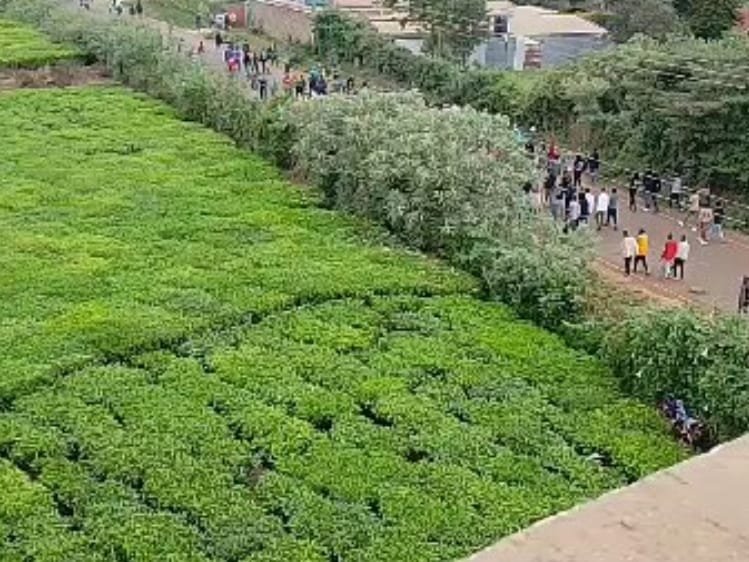Karatina University Students Protest Against Matatu Fare Hikes

Karatina University Students Protest Against Matatu Fare Hikes
Introduction
The recent matatu fare hike from KSh 50 to KSh 100 in Karatina has sparked significant unrest among students at Karatina University. This increase in transportation costs has raised concerns not only about affordability but also about the broader implications for student activism and the cost of living in Karatina. Students, often referred to as comrades in action, have rallied together to address the increasing public transport issues that directly affect their daily lives and academic pursuits.
The rise in matatu fares is not merely a financial burden but a reflection of the local transport crisis that many students are currently facing. With the cost of living on the rise, the fare hike has placed additional stress on students who are already navigating various financial challenges. This situation has led to a heightened response from the student body, as many view the fare increase as a violation of their rights to affordable transportation. Matatu operators argue that increased operational costs necessitate fare adjustments; however, students challenge this reasoning, emphasizing the necessity for reasonable transport affordability in their community.
The protests have garnered attention not only within the university but also in the broader Karatina community, highlighting the interconnectedness of student rights and local economic conditions. Through organized protest actions, students aim to amplify their voices and demand a reconsideration of the recent fare hikes. Their collective response signifies a vigorous wave of student activism aimed at addressing not just this issue, but also the underlying factors contributing to the rising costs students face on a regular basis. In this context, the protests reflect a crucial moment of unity and action among students at Karatina University, as they navigate the ongoing challenges posed by public transport issues and the impact on their education.
Background of the Fare Increase
The recent surge in matatu fares at Karatina University has generated significant concern among students, sparking extensive discussions and protests. The fare hike, which escalated from Ksh 50 to Ksh 100, can be attributed to several interconnected factors that have emerged over recent months. One of the primary reasons for this increase is the rising fuel prices, which have consistently affected the operational costs faced by matatu operators. This change in fuel costs directly influences the overall expenses associated with running public transport services.
Additionally, the local transport crisis exacerbated the situation as matatu operators sought ways to maintain profitability amidst escalating costs. The role of the matatu operators’ association has been critical in this scenario. They determined that raising fares was the only viable response to sustain their businesses. This decision has, however, sparked a notable backlash from students who rely heavily on affordable transport options. For many, the increase represents not just a change in travel costs, but a challenge to their financial stability, especially considering the broader context of rising living costs in Karatina.
Moreover, the growing financial strain is prompting student activism as comrades in action band together to advocate for their rights and affordable transport. The public transport issues surrounding the fare increase have led to organized protests, highlighting the collective response from the student body towards what they perceive as an unjustified financial burden. With the cost of living in Karatina continuously on the rise, many are questioning the fairness of the fare hike initiated by matatu operators. The unfolding situation is reflective of the broader challenges faced in balancing operational expenses while ensuring accessibility and affordability of transport for students.
Student Reactions
The recent matatu fare increase from Ksh 50 to Ksh 100 has sparked significant discontent among students at Karatina University, reflecting broader public transport issues that directly impact their daily lives. Many students have taken to social media and campus forums to express their frustration and anger over the sudden spike in transportation costs. For many, the struggle is more than just an inconvenience; it is a matter of financial strain amidst the already rising cost of living in Karatina.
Students have voiced their concerns about how the fare hike disproportionately affects those from low-income backgrounds, who rely heavily on affordable public transport to commute to university. One student shared, “I cannot believe that I now have to pay double to get to class. This is incredibly unfair and shows a lack of consideration for our financial situation.” Another mentioned, “For many of us, every coin counts. This fare increase is going to alter our budgets significantly.” These sentiments illustrate the pervasive feeling of helplessness among the student body, as they navigate the dual burdens of rising living costs and educational expenses.
In response to the fare hike, students have organized protest action, uniting under the banner of “Comrades in Action.” This movement underscores their commitment to student rights and their collective demand for transport affordability. The protests not only aim to address the immediate issue of fare increases but also highlight the ongoing local transport crisis that affects the wider community. As students mobilize to challenge matatu operators and advocate for fair pricing, it is evident that their activism has evolved into a significant form of student response to fare increase issues. Their actions symbolize not only their dissent but also a fight for the dignity of all commuters reliant on public transport, showcasing the power of student activism in creating community impact.
The Protest Begins
The recent matatu fare increase from Ksh 50 to Ksh 100 sparked widespread unrest among students at Karatina University, culminating in spirited protests that showcased the collective resolve of the student body. The protests were characterized by a mix of organization and spontaneity, as concerned students mobilized through social media platforms, urging their peers to take action against the rising transport costs that pose a significant threat to their affordability and student rights.
The initial gathering took place at the university’s main entrance, a strategic location that allowed the students to attract attention from passersby and the media. As word of the protests spread, more students joined in, creating a vibrant and energetic atmosphere that reflected their determination to address the pressing public transport issues affecting their community. The participants, often referred to as “comrades in action,” chanted slogans and displayed placards that articulated their discontent, emphasizing the impact of the fare hike on their daily lives.
As the group marched through key areas of Karatina town, their voices echoed concerns regarding the broader transport affordability crisis and the financial strain the fare increase placed on the student population amid rising cost of living in Karatina. Students expressed their anger not only towards the matatu operators but also demanded accountability from local authorities to address these transport challenges that have exacerbated the local transport crisis. This protest action was not just about the fare hike; it was a manifestation of the ongoing student activism driven by a desire for change and a better understanding of their rights.
The energy of the demonstrators was palpable, united in their call for transparency and fairness in public transport services. As student activism took center stage, the wave of determination and solidarity among the protesters exemplified the collective strength of their community in advocating for transport rights and ensuring a responsive dialogue between students and transport operators.
Key Messages and Demands
The recent protests by students at Karatina University against the significant increase in matatu fares from Ksh 50 to Ksh 100 have showcased a clear and resolute stance regarding public transport issues. These protests serve as a powerful example of student activism, demonstrating how comrades in action can mobilize against circumstances affecting their daily lives. The students’ primary demand is the urgent reversal of the fare hike. They argue that such increases in transport costs contribute to the rising cost of living in Karatina, making it even more challenging for students to afford basic necessities.
In addition to the fare reversal, the protesting students have called for greater accountability from matatu operators. They argue that the sudden fare hike lacks transparency and justification, highlighting the need for proper regulation and communication between the transport sector and the student community. Such accountability is critical not only to ensure fair pricing but also to foster trust and collaboration between local transport providers and their main consumers—students.
Furthermore, the protesting students have put forth several constructive suggestions aimed at alleviating the local transport crisis. They propose exploring alternative transportation solutions, such as university shuttle services or partnerships with local transport providers that could offer subsidized rates for students. The need for affordable transport is underscored by the awareness that many students rely heavily on these services to attend classes and fulfill their academic obligations.
By voicing their demands and advocating for their rights, the students at Karatina University have ignited a conversation about transport affordability and the broader implications of fare increases. Their collective response to the fare hike demonstrates the potential of student activism to address systemic issues within their community, marking a significant moment in Karatina University news.
Public Support and Community Involvement
The recent karatina university protests against the fare hike from Ksh 50 to Ksh 100 have garnered significant attention not only from the student body but also from the surrounding community. Local residents and fellow commuters have displayed palpable support for the students’ cause, reflecting a broader recognition of public transport issues affecting everyone in the area. The protests have highlighted the pressing challenges of transport affordability amidst rising costs of living in Karatina, which resonate deeply with many who rely on matatu operators for daily commutes.
Community involvement has manifested in various forms, with residents joining the protests to express their solidarity with the students. Some have shared their own experiences of financial strain due to the fare increase, identifying with the students’ plight as comrades in action. This mutual understanding has fostered a sense of unity among students and the broader community in addressing local transport crises and advocating for fairer transport practices. The activism displayed by the student body has spurred conversations about student rights and the responsibilities of matatu operators to ensure affordable transport options for everyone.
Community members have taken to social media to voice their opinions on the fare hike, expressing astonishment at the sudden increase and calling for action. The support demonstrated by locals has not gone unnoticed; it highlights the importance of collective action in navigating such public transport issues. This shared experience not only strengthens the bond between students and residents but also emphasizes the necessity for an integrated approach to community challenges. Such activism serves as a reminder of the potential impact that students and community members can have when they unite in pursuit of common goals regarding transport accessibility and affordability.
Responses from Matatu Operators
The recent karatina university protests in response to the substantial fare hike from Ksh 50 to Ksh 100 raised significant concerns regarding public transport and its affordability. Matatu operators, often at the center of such transport issues, have provided their perspectives amid this unrest. They argue that the fare increase is essential due to rising operational costs, including fuel and vehicle maintenance.
Matatu operators have issued statements emphasizing that the increase reflects the current economic landscape, highlighting the ever-pressing cost of living in Karatina. They assert that the adjustment in fares is not only necessary for their sustenance but also ensures the continuation of their services. Many operators lamented that current fare rates do not align with the economic realities they face. Moreover, they noted that the increase was intended to maintain a reliable and safe mode of transport for students and residents alike.
In response to the student activism surrounding the fare hikes, these operators expressed understanding toward the students’ dissatisfaction. However, they urged the students to consider the long-term implications of remaining stagnant in fare pricing amid rising costs. Matatu operators have suggested that the protests could incite further disruptions, ultimately affecting their ability to provide services. They indicated willingness to engage in dialogue with student representatives, hoping to discuss potential compromises or alternative solutions to address concerns regarding transport affordability.
The interaction between the students and matatu operators illustrates a community grappling with a local transport crisis. As both sides navigate these challenges, it remains critical to seek resolutions that maintain equitable access to transportation while addressing the financial realities faced by the operators. Moving forward, it will be essential for both parties to collaborate in finding sustainable solutions that benefit the community as a whole.
Impact on Campus Life
The recent karatina university protests have significantly disrupted the daily routines of students, as many grapple with the implications of the matatu fare increase. The increase from Ksh 50 to Ksh 100 has not only strained their financial resources but has also compelled students to rethink their transportation options. With public transport issues taking center stage, students are increasingly aware of their rights and the role these protests play in advocating for affordable transport.
This fare hike has created a local transport crisis, affecting students’ attendance and academic commitments. Many comrades in action have felt the need to adjust their schedules, leading to increased absenteeism from classes and study groups. The financial burden has prompted students to engage in more strategic planning around their budgets, often prioritizing essentials over academic-related expenditures. Additionally, the atmosphere on campus has shifted, with protests fostering a strong sense of student activism among the community.
Moreover, the ongoing protests have created a heightened awareness of the cost of living in Karatina among students. This has led to discussions surrounding transport affordability and the broader implications for student rights within the university. As the activist spirit grows, students are more united than ever in their fight for fairness, seeking not only to address the current fare hike but also to raise awareness about the broader issues plaguing their community, including the impact of matatu operators on daily commuting.
The community impact of these protests is evident as the student body rallies together, emphasizing the significance of collective action in fighting against economic injustices. The resultant dialogue on campus regarding public transport issues reflects a growing consciousness around the challenges faced by students, underscoring the necessity for ongoing engagement with local authorities. This pivotal moment may very well redefine the relationship between students and the broader community in a critical time for transport and economic sustainability.
Future Implications and Concluding Thoughts
The recent karatina university protests against the matatu fare increase from Ksh 50 to Ksh 100 have highlighted significant public transport issues that resonate beyond the student body. These protests serve as a microcosm of broader societal concerns regarding transport affordability and the cost of living in Karatina. As students took to the streets, emphasizing their rights as commuters, local matatu operators found themselves at the center of a heated dialogue about fare adjustments and the expectations of service delivery.
In the wake of such activism, one can speculate that a platform for dialogue may emerge between students and matatu operators. This could lead to negotiations aimed at finding a balance that safeguards the operators’ livelihood while ensuring that transport remains affordable for students. Such exchanges could not only address the immediate fare hike but could also instigate more significant discussions about sustainable transport solutions and compliance with student rights. If these constructive conversations occur, there is potential for lasting changes to the community’s transportation policies which may benefit both students and operators in the long run.
The protests have also shown the strength of student activism, elucidating how comrades in action can wield substantial influence over local issues. As the story unfolds in karatina university news, the ripple effects of these protests could contribute to a local transport crisis narrative that reshapes community attitudes towards public transport planning. Additionally, other universities facing similar challenges may take cues from Karatina’s proactive approach, leading to an increase in student-led advocacy across the region.
Overall, the protests not only signal a response to the immediate fare increase but also rally a community around broader issues of transport equity and rights. They remind us that student movements can catalyze important conversations around public transport reforms that will ultimately enhance the living conditions within the community.






